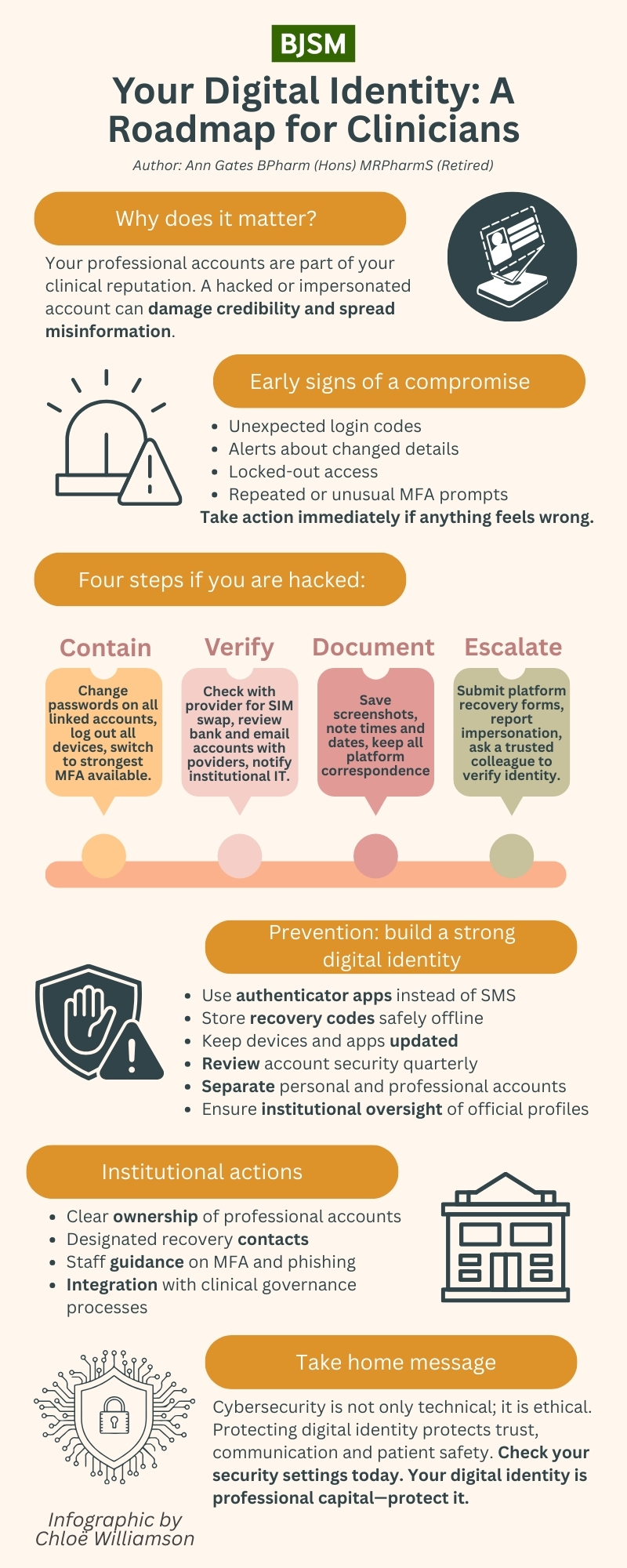**Digital Integrity in Healthcare: From a Teachable Moment to a Teachable Roadmap**
The intersection of technology and healthcare has revolutionized the way we communicate, access information, and provide care. But with these advances come new vulnerabilities, as a recent personal experience of mine starkly illustrated. A verified professional account on a major social media platform, which I had built since 2011 to share evidence-based exercise medicine and advocate for physical activity, was hijacked overnight. My brand was impersonated, and my access was revoked.
The incident was a wake-up call, revealing the unsettling truth that even when clinicians uphold exemplary digital hygiene, systemic vulnerabilities within recovery and verification workflows can undermine professional identity and the integrity of public health communication. It highlighted that cybersecurity is as much about culture and human behavior as it is about code.
It all began with two unexpected text messages on my phone, claiming to be from the platform. Not requested by me. Within minutes, I was refreshing screens, generating codes, and negotiating with algorithms that no longer recognized me. In that strange digital silence, I felt a sense of unease – a feeling every clinician knows: the moment you realize the system you trust has failed, and you must find a way to keep caring anyway.
My professional account, @exerciseworks, was more than just a social channel; it was a living repository of ideas, collaborations, communities, friends, and evidence linking movement to health. To lose it was to feel an entire professional ecosystem evaporate. Yet even as I worked to stabilize the crisis, I found myself shifting from frustration to reflection.
In healthcare, we speak of near misses, learning incidents, and root-cause analyses. Why should digital harms be viewed any differently? So, I reframed the hack as a teachable moment – not one defined by failure but by insight: our professional presence online is as fragile and vital as any system we safeguard in clinical practice.
Healthcare has long recognized that most adverse events arise not from individual mistakes but from system design and process gaps. Digital incidents deserve the same systemic thinking. Attackers increasingly exploit recovery workflows, authenticator fatigue, and social engineering of platform support teams. The result is that doing everything right may still not be enough – a humbling yet necessary insight for any clinician maintaining a professional digital presence.
When the breach occurred, I responded using the familiar logic of clinical governance: document, stabilize, escalate. My mobile operator confirmed there had been no SIM swap; my financial institutions were alerted; and I kept a detailed record of every step, screenshot, and correspondence. These actions mirrored the routines that preserve safety in clinical care – continuity, transparency, and evidence gathering.
However, the deeper learning was personal. Once the initial urgency passed, and I paused long enough to reflect, I realized that resilience is a muscle we train both online and offline. Cybersecurity, like exercise, is preventive medicine. It strengthens the connective tissue of trust between health professionals and the public.
Below is the emerging roadmap shaped by this experience:
**A Teachable Roadmap for Digital Integrity in Healthcare**
1. **Systemic thinking**: View digital incidents as opportunities to reconnect, reflect, and strengthen our professional integrity. 2. **Resilience training**: Recognize that cybersecurity, like exercise, is preventive medicine that strengthens the connective tissue of trust between health professionals and the public. 3. **Institutional stewardship**: Make safeguarding digital identity an act of ethical stewardship for our reputations, our science, and the integrity of the health messages we share. 4. **Standardized ownership**: Document ownership, recovery protocols, and designated validation contacts to prevent impersonation and unauthorized access.
**Conclusion**
Our professional presence online is as fragile and vital as any system we safeguard in clinical practice. Digital incidents deserve the same systemic thinking as adverse events in healthcare. By reframing digital security as an ethical responsibility tied to online safety, transparency, and public trust, we can strengthen our resilience within systems of trust.
This experience has reaffirmed a simple truth: safeguarding digital identity is an act of ethical stewardship for our reputations, our science, and the integrity of the health messages we share. Let us seize this teachable moment to reconnect, reflect, and strengthen our professional integrity.
**References**
1. OpenAI's ChatGPT 2. Ann Gates BPharm (Hons) MRPharmS (Retired) 3. Honorary Associate Professor, The University of Nottingham 4. Honorary Visiting Professor, Plymouth Marjon University 5. Collaborative Partner, Erasmus+ Vanguard Project
